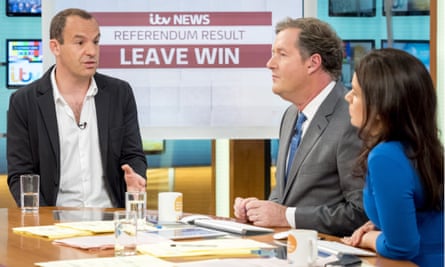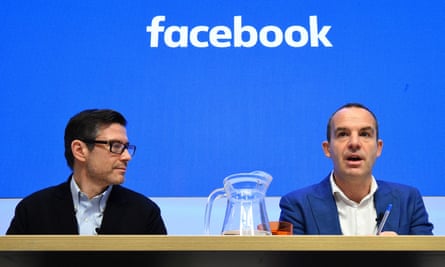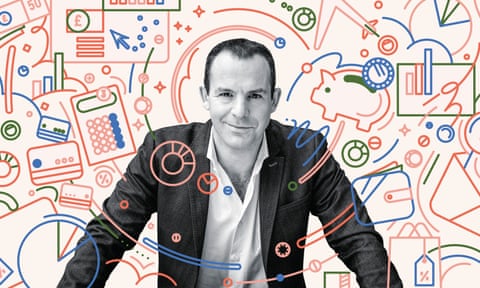Every Tuesday night, an email newsletter goes out to 13 million subscribers. It’s far more popular than Gwyneth Paltrow’s Goop newsletter, which has 8 million, and the New York Times Morning Briefing, with 1.7 million. Its name, Money Saving Expert’s Money Tips, barely hints at the astounding range of tricks and deals contained within. Recent emails have featured “hacks” for cheaper meals at Nando’s and McDonald’s, deals on broadband and savings accounts, codes giving discounted access to airport lounges and an offer for free radiator heat-reflector pads.
The newsletter looks like a relic from an earlier age of the internet: thousands of words, with no ads and few images. It began as an email that Martin Lewis – the personal finance journalist now better known as the Money Saving Expert – wrote for his friends. Today, it is the work of dozens of people at MoneySavingExpert.com, the website Lewis founded in 2003, which has become one of the 100 most popular sites in the UK, with 16 million visitors a month.
The business of saving money has made Lewis extremely wealthy. After he sold the site in 2012 to the price-comparison firm MoneySupermarket for £87m, the Financial Times called him “the most successful journalist in the world, ever”. A year later, he was the seventh most Googled celebrity in the UK, nestled between Taylor Swift and Beyoncé.
Lewis still worries over every line in the email each week. When I went to meet him on a Tuesday afternoon last July, he was studying the draft of that night’s newsletter, pondering aloud the merits of competing broadband deals. There was a gold piggy bank on his desk. It was the height of the heatwave, and Lewis, who is lean and often tanned, was dressed in the uniform of a sensible dad doing his best to enjoy a long-awaited summer holiday: a short-sleeved, stripy white shirt with a denim collar, denim shorts and the navy Skechers that he wore almost every time I met him.
At a time when money has become the measure of everything – when people often think of themselves as consumers rather than citizens – Lewis has become the most trusted man in Britain. In 2015, seven months before the EU referendum, a poll found that 71% of people trusted him when he talked about Europe, putting him ahead of any other public figure. He has achieved that status through an unusual combination of journalism, campaigning and light entertainment, without falling victim to the public’s suspicion of journalists, campaigners and entertainers.
In our age of insecurity, Lewis stands out as a reassuring source of authority. Addressing a country that has never been comfortable talking about money, Lewis takes us by the hand and guides us through the bewildering world of finance. He comes across as a kind of double agent, who goes undercover among the powerful then reports back to the rest of society. It may feel as though banks, corporations and energy companies are lined up against the individual, with few politicians willing to intervene, but Lewis’s work offers the alluring promise that in the battle between business and consumer, you can, with the right information, emerge the victor.
Today, at 46, Lewis is a TV personality as much as anything. He appears weekly on Good Morning Britain and This Morning, while his primetime ITV programme, The Martin Lewis Money Show, regularly attracts around 4 million viewers.
Lewis’s success depends on the trust he has built with the public, and he tends to this like an anxious parent. Everything featured on Money Saving Expert has been chosen by its editorial team, but once those recommendations have been decided on, the commercial team then tries to arrange deals with the companies offering the products. The site makes a commission when readers click on affiliated links for such products, which are marked with an asterisk. Still, when I joined Lewis for his meeting about the email, he was cautious. He worried that one description was too “selly”. “We don’t want people to think we’re advertising,” he said. A fidgety presence, he took great care with the recommendations, mindful of the impact they can have: Tesco Bank’s website once crashed when one of its savings accounts appeared in the email.
Lewis applies that same care to his campaigns and public pronouncements. He has based his career on just about the last thing we all have in common: the wish to save money. And he tends not to weigh in on the most contentious issues of the day, for fear of dividing opinion and undermining his sway. He believes he can have the biggest impact on society by changing our relationship to money – but it has become harder for him to stay out of politics altogether. He even weighed in on the EU referendum, although in an ostentatiously measured manner: “I’m generally risk-averse, and that pushes me just towards an IN vote for safety, maybe 55% to 45%,” he wrote on Money Saving Expert. When we spoke recently, Lewis told me: “I have built myself what is currently a unique position in trying to guide people to be better with their finances. And I don’t want to do anything to screw that, to get rid of that trust.”

With his fiery rhetoric, his efforts to defend the little guy against vested interests, Lewis may look like a populist. But, at heart, he has a technocratic temperament: he identifies specific problems, and tries to solve them with tweaks. On the rare occasions when he does speak out, it’s because he has decided the system has stopped working properly.
Lewis is, in short, a centrist – perhaps the only truly popular centrist in Britain. Instead of seeking structural change, his formula combines educating the public with campaigning for small adjustments to the system. But at a time of growing inequality, with politicians unwilling or unable to hold corporations to account, is this enough? What is needed, the economist John Kay told me, “is not more information from the financial services industry, but actually an industry that is trustworthy and reliable”. The question remains whether Lewis’s approach is the best we can hope for, or a distraction from real change.
There’s nothing new about wanting to save money. But now, a decade after the financial crisis, it feels particularly urgent. It’s clear that things will never go back to normal: the days of a secure job for life, with a steadily rising salary and a generous pension pot, are over. You won’t be able to support yourself through old age on your pension alone; you might never make enough to afford your own home.
You need to be prudent, but how? Since the deregulation and privatisations of the 1980s, we have had to make more and more financial decisions, and they have become dizzyingly complex. There are so many options: Britain has more than 300 banks, dozens of energy companies. Then there are all the credit cards, broadband providers, mobile networks. You know that if make the wrong choice you will get ripped off. It’s easy to panic or to bury your head in the sand.
What has made Lewis so popular is that he offers a concrete response to this uncertainty. His work holds out the hope that you can take control of your finances and your life. This isn’t a question of stopping spending. “I don’t think being tight is a particularly sensible thing with money,” he told me. He wants to help people get more from the money they have, and reduce the stress that money can cause. The trick is to “play the system, understand how it works, get the best products” – to turn modern finance’s diversity to your own advantage, rather than being overwhelmed and exploited by it.
In this respect, Lewis is less like a doctor, doling out pills for the patient to swallow, than a personal trainer: he promises to make you stronger through your own hard work. And no matter how little you understand at first, you can still judge his advice for yourself by its effect on your bank balance. This is what has saved Lewis from the fate of so many experts, who incur resentment by appearing to lord their expertise over everyone else. Instead of just telling you what to do, Lewis makes you feel as if you, too, can become a money-saving expert.
When Lewis was in charge of Money Saving Expert, he worked up to 90 hours a week. Since selling the company, he has continued to play an important role, as executive chairman, and pictures of him wearing a confident expression appear all over the website like a talisman against profligacy. But even though he has cut down, to 50 or 60 hours, his schedule still appears exhausting in its variety and intensity. Rather than prioritising a particular audience, he addresses whoever he can, modulating his message each time like a shrewd ambassador for financial prudence. What matters to him is getting the word out.
On a Monday morning last summer, I accompanied Lewis to ITV’s studios in west London for his appearance on This Morning. As he waited to go on set, he asked a member of the crew if she watched Love Island. She didn’t. “I’m thinking of doing Love Island this year,” he said. When his turn on This Morning came, he took questions about student finance from callers, staring intensely at the camera as he listened. As usual, he spoke in rapidfire bursts, slowing down theatrically for emphasis.
After that, he got a motorbike taxi to Broadcasting House, the BBC headquarters, for his weekly Radio 5 Live phone-in. The segment was introduced with the song Bills, by the American singer LunchMoney Lewis, and as it played Lewis air drummed, bobbing his head. It was a longer slot than This Morning, with a more leisurely pace; the callers seemed canny, and Lewis responded with a level of detail he tends to avoid on TV. That afternoon, he attended a meeting at the Money and Mental Health Policy Institute, a charity that he founded in 2016, to carry out research and campaigns on the connection between mental illness and financial problems.

The next day, Lewis met with Matt Hancock, who was then the culture secretary. It was a few weeks after Lewis had announced that he was suing Facebook for defamation, over fake adverts that featured his name and image, and the pair discussed online ads and scams. That evening, Lewis started tweeting about Love Island. “I’ve never watched before – I’m trying it this time – and yes I am intrigued,” he told his 566,000 followers. On Good Morning Britain that week, he referred to a Love Island contestant’s “semi-permanent Russian lashes”. When a presenter asked what made the lashes Russian, Lewis responded, “maybe they need to get them on quickly”. (He was once a finalist in a competition for young Jewish stand-up comedians.) He made a “ba-dum-tish” sound, with a drumming gesture, and walked off the set. Two days later, he wrote a comment piece for the Financial Times, proposing reforms to student finance.
Lewis, who has a knack for remembering numbers, is happy to play the role of a financial savant in his TV appearances. “Is there something you don’t know? Anything you don’t know?” Angellica Bell, his co-host on The Martin Lewis Money Show, asked in a recent live special. But his displays of knowledge are mostly for show: their purpose is not so much to convey information as to demonstrate his mastery of the material, his fitness to instruct. His actual advice, on the other hand, is often surprisingly simple.
Consider the “Money Mantras”, the cornerstone of the Money Saving Expert philosophy. Before buying anything, you ask yourself two questions. If you’re broke: “Do I need it? Can I afford it?” If you can afford the item: “Will I use it? Is it worth it?” If the answer to any of the questions is “No”, then it’s clear: don’t buy it.
If that seems obvious, then Lewis’s prescription for budgeting is a little more technical. You do an audit of your outgoings, to establish how much you can actually afford to spend. Then you single out a few main categories: these might be bills, holidays, Christmas, savings and big purchases. You open a dedicated bank account for each of them, and use standing orders from your main account to ensure you’re setting aside what you need for every category. It’s fairly straightforward, but takes a lot of effort to set up – a day’s work, in Lewis’s estimation. He calls this technique “piggybanking”, with each account a different piggybank.
Money Saving Expert has proved to be very effective at making money, yet Lewis considers it a public service above all. “This is a mission,” he says. “It’s a consumer website, but it’s not there to be all wonderful and give people what they want. All they would want is £10-off shopping vouchers, because they’re fun and most people don’t want to deal with their finances. And we have a job to twist their nipples in any way we can.”
One morning, a couple of months after he met Hancock, I joined Lewis on the 50-minute walk from his home just outside central London to the Money Saving Expert office. Lewis tries to walk everywhere. According to his fitness tracker, he averaged 13 miles a day in 2018, a 4% fall on the previous year. The route had just taken us through Regent’s Park; as we got on to Euston Road, Lewis told me about arriving at Cardiff University in 1997, to do a postgraduate diploma in journalism. “Everybody else wanted to be a war correspondent or go in fighting zones,” he said. “I talked about doing money on This Morning.”
Lewis was born in Manchester in 1973 and spent most of his childhood in Delamere Forest in Cheshire, where his father ran a Jewish boarding school for pupils with special needs. Three days before Lewis’s 12th birthday, his mother was killed in a road accident. Losing a parent at a young age “gives you a drive,” he said in a talk in 2014. “Nothing is going to be quite as bad as it’s already been, so you can go for it.”
After studying at the London School of Economics, Lewis spent two years working in financial PR, then moved into journalism. He got his first job on air when a cable channel devoted to finance, Simply Money, launched in 2000. Angela Rippon, the TV presenter who fronted the channel, told me that it was Lewis’s sketches that made him distinctive. Alongside his regular reporting, he dressed up as different characters – Dracula, a card dealer – in order to illustrate his points. One of Lewis’s strengths as a broadcaster is that he is not afraid to be naff – in fact, he revels in the naff. “It engaged the viewers in a way that financial reporting had never done before,” Rippon said. He has never been bothered by accusations that he is dumbing down. “I know I’m good at what I do,” he said. “For me, the passion is about reaching real people and getting them to be better on their finances.”
In his first year at Simply Money, Lewis asked to be known on-screen as “the Money Saving Expert”. After the channel shut down, he kept the name, paid £100 to a web designer in Uzbekistan – his sole capital outlay in the decade that he owned Money Saving Expert – and launched the site in 2003.
Back then, Lewis told me, media coverage of personal finance was limited to “investment, protection, and maybe mortgages if you want to be radical”. What he had in mind was something different: a one-stop shop that covered money as it works in everyday life. That meant advice on supermarkets (“eye-level products are where the profit is”) and where to get the cheapest DVD rentals and perfume. “He has taken it into getting a good deal in every single aspect of your life,” says Anne Ashworth, who edits the Times’s Money section. By moving beyond the constraints of traditional personal finance journalism, he became, more and more, a life coach.
What was particularly striking about Lewis’s approach was how confrontational it was. Money Saving Expert’s home page used to have a promise for readers: “Companies try to screw us for profits. Money-saving shows you how to screw them back.” Journalists had long singled out firms that shortchanged their customers, but this was undiscriminating – it suggested that consumers couldn’t trust anyone. In The Money Diet, his 2004 guide to saving money, which doubles as a kind of early manifesto, Lewis argued that it was the job of businesses to make money – “nowt wrong with that”. But for that very reason, he wrote, “all companies are the enemy”.

The tools offered by the site don’t always match up to this rhetoric. The Money Mantras alone won’t help you screw companies back. It takes real effort; you have to exploit the loopholes identified by Money Saving Expert, and mop up one introductory offer after another. In the argot of the website, people who keep doing this by switching banks are approvingly referred to as “tarts”.
Money Saving Expert quickly took off: by 2006, it was getting 1m visitors a month. As it expanded, Lewis’s profile grew. He got an ITV series; another series, It Pays to Watch!, aired on Five in 2008, the year the global financial crisis inaugurated an era of perpetual insecurity. In 2012, when ITV launched The Martin Lewis Money Show, he finally got what he had spent years working towards: a programme at primetime. It airs on Mondays at 8pm, between episodes of Coronation Street. The show is centred on questions that Lewis takes from members of the public, at roadshows around the country. It’s slicker than his earlier programmes, but features the kind of sketches that he first tried out on Simply Money, giving it something of a variety-show feel.
In June, Lewis recorded a live special of the show at Warwick Castle. A Martin Lewis Money Show flag, featuring coins, notes, credit cards and a piggy bank, flew from the tower. Lewis wandered around beforehand, looking a little nervous. He was more smartly dressed than usual, and boasted to the audience that he had bought his blazer in a sale. “We’re going to save millions of people lots of money,” he told them, “which is why I get out of bed in the morning.” During the show, Lewis reminded everyone going away that summer to pack their European Health Insurance Card; by the end of the episode, the EHIC website had crashed.
Lewis is fond of saying that he has never been interested in money; he’s more interested in what having money allows you to do, and the problems that stem from not having it. He considers himself “a politician with a small p”, whose goal is to achieve “financial justice”. He has tried his best to do this while keeping out of the political fray. But over the past few years, that balancing act has become impossible. Reluctantly, Lewis has found himself dragged into politics.
Lewis’s first campaign, in 2005, was against bank charges: the fees levied on customers who go beyond their overdraft limit. At the time, even if someone was just a penny over the limit, they usually had to pay their bank about £35. Since Lewis started campaigning against the charges, 7m template letters – which people fill in and send to their bank, in order to request that the charges be repaid – have been downloaded from Money Saving Expert and £1bn reclaimed. The campaign inspired a song, I Fought the Lloyds by Oystar, a comedy-rock band whose singer had used Money Saving Expert to challenge the charges. It charted at #No 25 and Lewis made a cameo in the video.
Not long after that campaign, Lewis deployed similar tactics against banks that had missold payment protection insurance (PPI) to customers. This time, Money Saving Expert’s template letters resulted in as much as £5bn in compensation. More recently, Lewis has taken a different approach, by challenging the government itself. In 2011, soon after it was announced that university tuition fees would rise from £3,290 a year to a maximum of £9,000, Lewis was appointed head of the Independent Taskforce on Student Finance Information, which sought to explain what the new fees would involve. At the time, Lewis said he was “no fan of the changes”, but his priority was ensuring that everyone was properly informed about them. “There were people he could communicate with who wouldn’t have trusted politicians,” says David Willetts, the universities minister at the time.
Lewis turned on the government when it froze the repayment threshold – the amount graduates need to earn before they start paying off their loans. Having been set at £21,000, this was meant to eventually increase every year, but in 2015 George Osborne backtracked. Lewis was appalled. In articles and TV appearances, he kept making his case; he met with Jo Johnson, who was then the universities minister. In 2017, Theresa May finally relented: she announced the threshold would go up after all, to £25,000, and increase thereafter.
Lewis’s journalism offers lessons in self-reliance, ways for individuals to protect themselves. But he acknowledges that this isn’t always enough. “There are people out there who have less income than the basic minimum they need to subsist,” he says. As part of his efforts towards “financial justice”, he has pledged around £20m to charity.
Perhaps Lewis’s most high-profile public intervention came last year, when he learned that his image was being used on targeted Facebook adverts without his consent. Many of them claimed he was endorsing bitcoin schemes that were actually fronts for ultra-high-risk investments; one woman lost £100,000 as a result. Lewis approached Facebook about the ads but it failed to take any serious action, so he decided to sue.
When he announced the lawsuit in April, it struck a nerve. The story made the front pages. Lewis was all over television, but he looked rattled. Unlike his previous campaigns, this one was personal and he didn’t enjoy the attention. “I do not handle stress particularly well. I am a very shy person,” he told me. Lewis is very protective of his privacy. He is married to Lara Lewington, a BBC presenter, with whom he has a six-year-old daughter. When I joined him on his walk to work, we didn’t meet at his home; instead, I waited at a hotel nearby. When he eventually called me to arrange a meeting point, his number showed up as “No caller ID”.

It’s tempting to see the Facebook lawsuit as a dramatic battle: Lewis, the people’s champion, taking on an unaccountable Silicon Valley behemoth. Even politicians unwilling to challenge the firm wanted him to play that role. “I have had, let’s say, very senior members of government who have pressured me and said: ‘Please don’t settle. Take it to court, set a precedent’,” Lewis said. Yet his aim was, as ever, more modest. “This is not an anti-Facebook campaign,” he told me, when we discussed the lawsuit last year. “This is an anti-scam ads campaign.” Last week, he announced that he was dropping the case because Facebook had agreed to introduce new measures tackling scam ads.
There was a time when Lewis wanted to go into politics. At the LSE, he was elected head of the student union. He ran as an independent; the union had previously been dominated by the far left, and Lewis promised to deliver “a student union for all”. Outside the LSE, Lewis was affiliated with the Lib Dems, and led the party in the National Union of Students. “I had no doubt he would go on to be a Lib Dem MP,” said Raj Jethwa, who ran against Lewis in the student union elections.
It’s easy to imagine Lewis as an MP: he has the verbal tics of a modern politician, often starting his sentences with a “look” or “listen”. Even after setting up Money Saving Expert, Lewis still imagined he would eventually run for parliament. But when he hit his mid-30s, he decided he wasn’t suited to a career in politics. “I know I couldn’t cope with it,” he told me. “I’m nowhere near as a robust as I was when I was younger.”
A few years ago, Lewis applied to be a cross-bench member of the House of Lords – a process open to anyone – and was rejected. He is keen to stress that he doesn’t identify as party political, though he has been approached by numerous parties, including United for Change, the new centrist party. He sees himself “somewhere from a wet Tory, a right Labour or a Lib Dem”. That outlook doesn’t always square with his more incendiary rhetoric. Throughout his career, Lewis has railed against the excesses of business, and seen first-hand how they can affect people; he has attacked banks and energy companies. But while he seeks to empower individual consumers, he stops short of calling for radical solutions that might level the playing field altogether: drastic regulation, or even nationalisation. His work seems to add up to a damning critique of the status quo, without seeking to fundamentally change it.
Money Saving Expert operates according to the optimistic principle that if someone knows enough, they should be able to make the right decisions. When I went to events where Lewis was filming and spoke to the people in attendance, I was struck by how clued up they were. They had saved thousands through cashback services, or switching between credit cards – tricks they had learned from Lewis. But in their commitment to saving money, they were willing to put in the kind of time that most people just don’t have.
What kind of an impact has Lewis had on the less savvy, who he has tried so hard to reach? He has certainly helped lots of people: the millions of template letters downloaded from his site testify to that. But according to a Financial Conduct Authority survey from 2017, 46% of adults in the UK say they have low knowledge of financial matters; 24% have little or no confidence in managing their money. In 2017, British households spent around £900 more, on average, than they earned. For many, there are stumbling blocks to following Lewis’s advice. “People are not making decisions on a level playing field,” says Liz McFall, a sociologist at the University of Edinburgh. “Not everyone has access to the same things” – such as 0% credit card deals.
Yet there is more to Lewis’s ambitions than simply educating people about money. He wants to change the way they think and talk about it. “If we take the American look at money, which is where money is just something open that you communicate about, I actually think that is healthier than our more British poe-facedness,” he told me.
That reticence can have dire consequences. “I think some of the gender pay gap is because we don’t talk about salaries in this country,” Lewis says. Not discussing money also affects how much we spend on things. “If I don’t know how much you paid for your plumber, how do I know what I’m supposed to pay for my plumber?” Through his work, Lewis meets people with crippling debts, and sees the psychological toll that money can take. He can be emotional on screen, and open about his own vulnerabilities. When people are unable to talk about their finances, he says, it means they are unable to talk about the problems that stem from them. “That’s not good for our society.”
That may be slowly changing. McFall notes that many younger people are open about the financial difficulties they face: their high student loan debt, the obstacles to buying a first property. “All of those things mean that financial details about how people live are in the public sphere in a way that they weren’t, historically,” she says. But Lewis thinks there is a long way to go. “We have got rid of the taboo of talking about sex and religion. And thankfully, we’re starting to get rid of the taboo of talking about your mental health. But money’s still there.”
Lewis is constantly reminded that his work is incomplete. When I joined him on his walk to work, he told me about something he had recently overheard in a restaurant. A group of young professionals had been sitting near him, discussing which cards they use when they go overseas. “They were all getting it so wrong,” he said, as we walked down Oxford Street. “I found them painful.” He sounded personally affronted. I wondered why he cared so much about what other people did with their money. What was it about the conversation that he had found so painful? “Because it’s fact!” he said, his voice rising in exasperation. “It’s not opinion. It’s just a simple fact.” Like many experts, he seemed to feel that if people just listened to him, it would make everyone’s lives so much easier.
This is the territory in which Lewis is still most comfortable: the realm of the indisputable, where one figure is higher than another, where there is no politics or emotion to complicate and corrupt. With money, countless things will always remain uncertain: which stocks will go up, say, or when to buy euros for your holiday. That’s not what Lewis is about. “People want to know what to invest in; I don’t know,” he said. “But I do know what the best card to spend abroad is. Manifestly, directly, on a spreadsheet, no question. I know the answer.”
